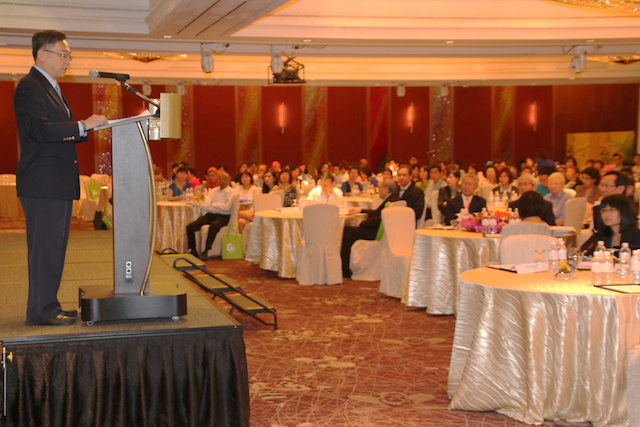Seniors “an engine for national development”
Minister Gan Kim Yong calls for a mindset shift to achieve successful ageing.
“Older persons can be an engine for national development, contributing to our community, our society and to our economic growth, for many years,” said Health Minister Gan Kim Yong, speaking at the SG50 Scientific Conference on Ageing organised by the Gerontological Society of Singapore (GSS). The theme this year was “Ageing in Singapore in the next 50 years”.
Sharing the challenges that population ageing can bring including a shrinking workforce, higher demand on healthcare and aged care, and burden on the young and inter-generational tensions, which are being faced in some fast ageing countries, he said the challenge of a “silver tsunami” is a real one.
A need to re-think
However, “we can still succeed as individuals and as a nation despite a fast ageing population,” said Minister Gan, who noted that in Singapore, the number of seniors aged over 65 years will more than double from 430,000 today to over 900,000 in 2030. “We need to take a long-term view and start to make fundamental changes in the way we organise our society, economy, systems and policies”.
He said that there is a need to re-think learning, work and retirement. “Fifty years ago, when life expectancy was about 70 years, we may retire in our 50s. But as our life expectancy increases to 85 and further closer to 100 in time to come, do we still retire at the same age and spend half of our lives in retirement? That will be decades of our lives in retirement. What do we do with all this time on our hands?” he said.
Minister Gan, who is also chairman of the Ministerial Committee on Ageing, said at the individual level, “14 years of formal schooling surely cannot be adequate for an expanding work life”. Workplaces need to adapt and consider various aspects such as job roles, work hours, model of remuneration, work environment and work culture.
Mindset shift
He also noted the need to keep people healthy until they are older as they live longer and that his Ministry will place a “greater emphasis” on preventive health.
Though the Government has expanded the capacity of acute and community hospitals, he said the centre of gravity of the healthcare system will have to increasingly shift to primary care, and home and community aged care to help support ageing-in-place.
He said six regional healthcare systems have stepped up its preventive care efforts, including Alexandra Health System (AHS), which has worked with local communities in the north and northwest region to screen some 6,500 residents there. It also has started an ageing-in-place programme where community nurses are deployed to patients who have been admitted multiple times to Khoo Teck Puat Hospital (KTPH) and visit them at home.
He added that if ageing is to be positive, there needs to be a mindset shift. “We have a much higher chance of achieving successful ageing if individuals do not associate ageing with mere decline, loss of value, or worse, disability. Likewise, we have a better chance at productive longevity if employers do not have a negative view about seniors, and if the young and society as a whole do not hold a pessimistic and deterministic view of ageing.”
Minister Gan also touched on urban planning and the need to evolve with population ageing. This includes making the transport system more senior-friendly and minimising fall risks in the environment and involving the community to look out for their older neighbours.


0 Comments